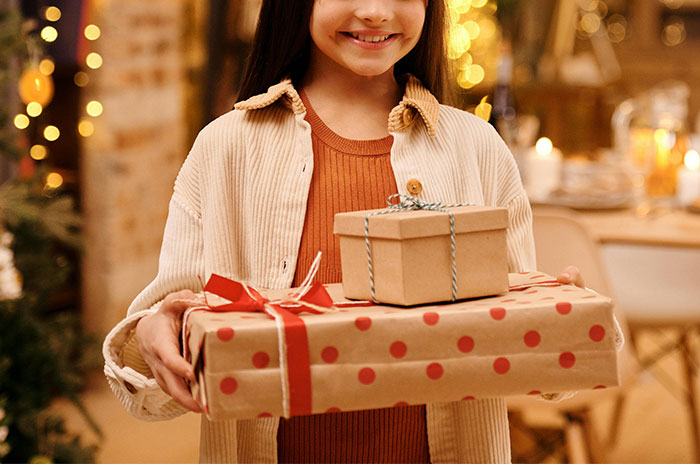December is just around the corner, which means that more and more parents are beginning to plan their Christmas.
Since money tends to get tight around the holiday season, a huge part of the preparation boils down to budgeting.
But when content creator Sinead Baldev shared a video talking about her thoughts on this year’s expenses, she also mentioned her family’s past figures and the numbers ignited a heated online debate.
People were divided in the way they received the news that Baldev used to spend £3,500 to £4,000 (roughly $4,385 to $5,010) per child for the occasion.
More info:Instagram|TikTok
This content creator and mom-of-three invited her 495,800 TikTok followers to talk about Christmas budgeting

Image credits:Nicole Michalou (not the actual photo)
And eventually shared the changes she’s going to make to hers

Image credits:sineadbaldev
Now this comment absolutely blew my mind:
‘This year I think £2,000 to £3,000 pounds, but that’s only because I’m getting the iPhone 15. But normal years, it’s about one to two thousand pounds.'”

“Now, a lot of people would say this is outrageous. However, this is how much I normally spend, shall I say, per child. So last year, I must have spent, I’d say, around £3,500 to £4,000 on Christmas presents for these kids. Taige got bored. Like, he couldn’t even be [bothered] opening the presents. He opened about three or four things. He was bored. Same with Inayah. Mia obviously opened all of hers, but it’s a lot of money.
So this year, I’ve reined it in. I have absolutely reined it in. Because the amount of stuff that I have taken out of this house these past couple of weeks – the toys, the clothes, everything. 40 bin liners I took to the tip of things that don’t get used anymore – broken toys, etc., etc.”

“I ain’t doing it. I’m not doing it. This, for me as well, is not about affordability. If I wanted to go spend three, four thousand pounds, this is not me boasting on buying the kids Christmas presents, and I absolutely could. But I’m not doing it. I also want these children to learn and understand that Christmas is not about presents.
I have done a lot of self-reflecting this year. I have worked so hard on myself. And y’all know, from me shopping, I am quite materialistic. But it don’t mean st. Like, it literally does not mean st. As I said in the other video, if I did say to my kids, you know, I’ve only got £50 this year, I’ve only got £100 this year, whatever it may be, this is what the budget is, they’d be very, very grateful for whatever it is that they get.”

“But there’s absolutely no way I’m pulling out £3,000 and £4,000 for Christmas presents this year. I’m not doing it. So as I was laid in bed, in my flair, I’m thinking, the mum guilt were, you know, kinda kicking in. Is £500 enough? Is it? Isn’t it? How much are other parents spending? What are these kids getting for Christmas? How much do their parents spend on them? Am I being a bad parent? Am I not giving them enough? You know how it goes when you’re a mum!”


The old adage that it’s the thought that counts when it comes to presents actually holds true

Image credits:Ylanite Koppens (not the actual photo)
Gifts create connections and obligations between the parties and they symbolize what the recipient means to you, says Paul Ballantine, head of school at the University of Canterbury’s business school in New Zealand.
That’s why a box of chocolates might not be enough for Sinead and other parents who are on the hunt for Christmas presents for their children. But an expensive toy doesn’t guarantee success, either. It simply fulfills the expectation of you getting them something but it is generic as opposed to being symbolic, explains Ballantine, who has researched many aspects of gifting.
“It says, ‘I have not needed to think about it but here is a gift anyway,'” headds.
If, instead, you put in the extra effort to tell the person that you like, love, and truly understand them, what their interests are, or acknowledge their tastes and desires, cost takes a back seat. It truly is the thought that counts, he says. Not the price tag.
Interestingly, research suggests that the giver and their feeling of self-worth often benefit more from the exchange than the receiver. For example, even toddlersexhibitgreater happiness when giving treats to others than receiving them themselves.
People continued to share their family’s Christmas expenses


















 You May LikeTo Pass The Time, Here Are 80 Best Christmas Episodes You Can WatchLarysa Perih81 Traditional Christmas Foods To Feast OnJustina ČiapaitėPeople Shared The Weirdest Things Kids Asked For ChristmasŽydrūnė Trukanavičiūtė
You May LikeTo Pass The Time, Here Are 80 Best Christmas Episodes You Can WatchLarysa Perih81 Traditional Christmas Foods To Feast OnJustina ČiapaitėPeople Shared The Weirdest Things Kids Asked For ChristmasŽydrūnė Trukanavičiūtė
Larysa Perih
Justina Čiapaitė
Žydrūnė Trukanavičiūtė
Occasions